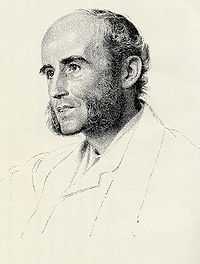John Richard Green
| John Richard Green | |
|---|---|
|
John Richard Green | |
| Born |
12 December 1837 Oxford, England |
| Died | 7 March 1883 (aged 45) |
| Nationality | English |
| Ethnicity | White |
| Citizenship | British |
| Alma mater | Jesus College, Oxford |
| Occupation | Clergyman, historian, librarian |
| Years active | 1869–1883 |
| Known for | A Short History of the English People |
| Spouse(s) | Alice Stopford (m. 1877–83) |
| Relatives | Anglican |
John Richard Green (12 December 1837 – 7 March 1883) was an English historian.
Early life
Born the son of a tradesman in Oxford, where he was educated, first at Magdalen College School, and then at Jesus College where he is commemorated by the J. R. Green Society, which meets twice a term.
Career
Religious career
He entered the Church, and served various cures in London, under a constant strain caused by delicate health. Always an enthusiastic student of history, the little leisure time he had was devoted to research.
Turn to historical writings
In 1869 he finally gave up his work as a clergyman, and was appointed librarian at Lambeth. He had been laying plans for various historical works, including a History of the English Church as exhibited in a series of Lives of the Archbishops of Canterbury, and, what he proposed as his magnum opus, a history of England under the Angevin kings. After suffering from failing health he abandoned these projects and instead concentrated his energies on the preparation of his A Short History of the English People, which appeared in 1874, and at once gave him an assured place in the first rank of historical writers.
Abandoning his proposed history of the Angevins, he confined himself to expanding his Short History into A History of the English People in 4 volumes. (1878–80), and writing The Making of England, of which one volume only, coming down to 828, had appeared when he died at Mentone in March 1883. After his death appeared The Conquest of England.
The Short History, which in 1915 was republished as part of the Everyman Library, may be said to have begun a new epoch in the writing of history, making the social, industrial, and moral progress of the people its main theme.
More recently J. W. Burrow proposed that Green, like William Stubbs and Edward Augustus Freeman, was an historical scholar with little or no experience of public affairs, with views of the present that were Romantically historicised, and who was drawn to history by what was in a broad sense an antiquarian passion for the past, as well as a patriotic and populist impulse to identify the nation and its institutions as the collective subject of English history, making
- ...the new historiography of early medieval times an extension, filling out and democratising, of older Whig notions of continuity. It was Stubbs who presented this most substantially; Green who made it popular and dramatic... It is in Freeman...of the three the most purely a narrative historian, that the strains are most apparent.[1]
Personal life
In 1877 he married Alice Stopford.
Health
During the 1870s Green suffered from lung problems. His wife assisted him in carrying out and completing his work as his broken health took its toll during his few remaining years.
Works
- (1874) A Short History of the English People
- (1879) English Literature (Editor)
- (1879) Readings From English History (Editor)
- (1880) A History of the English People
- (1883) The Making of England
- (1884) The Conquest of England
References
- Notes
- ↑ Burrow 1981, p. 227.
- Bibliography
- Burrow, J. W. (1981). A Liberal Descent: Victorian Historians and the English Past. Cambridge: Cambridge University Press. ISBN 978-0-521-24079-6.
![]() This article incorporates text from a publication now in the public domain: Cousin, John William (1910). A Short Biographical Dictionary of English Literature. London: J. M. Dent & Sons. Wikisource
This article incorporates text from a publication now in the public domain: Cousin, John William (1910). A Short Biographical Dictionary of English Literature. London: J. M. Dent & Sons. Wikisource
Further reading
- W. G. Addison, J. R. Green (1946).
- P. B. M. Blaas, Continuity and Anachronism (1978).
- A. Brundage, The People's Historian: John Richard Green and the Writing of History in Victorian England (1994).
- R. Jann, The Art and Science of Victorian History (1985).
- R. B. McDowell, Alice Stopford Green: A Passionate Historian (1967).
- R. L. Schuyler, ‘John Richard Green and his short history’, Political Science Quarterly, 64 (1949), pp. 321–54.
- Leslie Stephen (ed.), The Letters of John Richard Green. (1901).
External links
| Wikisource has original works written by or about: John Richard Green |
- Works by John Richard Green at Project Gutenberg
- Works by J. R. Green at Project Gutenberg
- Works by or about John Richard Green at Internet Archive
|
